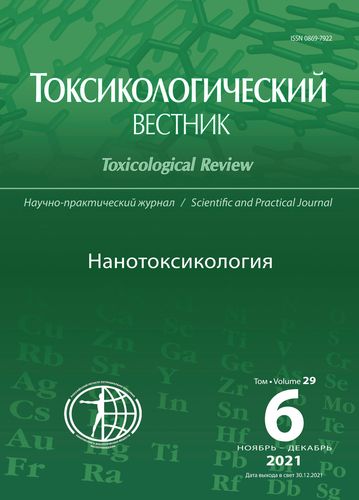Effects of long-term oral administration of silver nanoparticles on the cognitive functions of mammals
- Authors: Antsiferova A.A.1, Kopaeva M.Y.1, Kochkin V.N.1, Kashkarov P.K.1,2
-
Affiliations:
- National Research Center "Kurchatov Institute"
- Lomonosov Moscow State University
- Issue: No 6 (2021)
- Pages: 33-38
- Section: Original articles
- Published: 23.12.2021
- URL: https://rjsocmed.com/0869-7922/article/view/641400
- DOI: https://doi.org/10.36946/0869-7922-2021-29-6-33-38
- ID: 641400
Cite item
Full Text
Abstract
Introduction. Since the beginning of the XXI century, silver nanoparticles have been widely used in various industries, medicine and pharmaceuticals due to their pronounced antibacterial, antiviral and fungicidal properties. In connection with such a high demand for the use of silver nanoparticles, it is very important to understand the associated potential risks from their use.
Materials and methods. In the course of the work, there has been a study of the effects of the long-term oral administration of a commercially produced dietary supplement based on silver nanoparticles with a size of 34 nm and stabilized with polyvinylpyrrolidone in an amount of 50 μg/day/animal on the cognitive functions of C57Bl/6 mice, as well as their accumulation in the brain by the method of instrumental neutron activation analysis. The dietary supplement used is recommended for people as a treatment for gastrointestinal infections.
Results. It was found that after 180 days of administration, silver nanoparticles impair long-term contextual memory, and over time, the content of silver in the brain increases.
Conclusion. Presumably impaired cognitive function with accumulation of silver in the brains of mice. This poses the risk of prolonged oral use of the silver nanoparticles.
About the authors
Anna Alexandrovna Antsiferova
National Research Center "Kurchatov Institute"
Author for correspondence.
Email: antsiferova_aa@nrcki.ru
Candidate of physical and mathematical sciences, acting head of the Laboratory of nanotechnologies and nanomaterials safety of the National research center “Kurchatov Institute”, Moscow, 123182, Russian Federation.
e-mail: antsiferova_aa@nrcki.ru
Russian FederationMarina Yurievna Kopaeva
National Research Center "Kurchatov Institute"
Email: m.kopaeva@mail.ru
Научный сотрудник НИЦ «Курчатовский институт», 123182, г. Москва
e-mail: m.kopaeva@mail.ru
Russian FederationVyacheslav Nikolaevich Kochkin
National Research Center "Kurchatov Institute"
Email: kochkin_vn@nrcki.ru
Кандидат физико-математических наук, начальник лаборатории нейтронной дозиметрии НИЦ «Курчатовский институт», 123182, г. Москва
e-mail: kochkin_vn@nrcki.ru
Russian FederationPavel Konstantinovich Kashkarov
National Research Center "Kurchatov Institute"; Lomonosov Moscow State University
Email: kashkarov_pk@nrcki.ru
Доктор физико-математических наук, профессор, помощник президента НИЦ «Курчатовский институт», 123182, г. Москва
e-mail: kashkarov_pk@nrcki.ru
Russian FederationReferences
- Shcherbakov A.B., Korchak G.I., Surmasheva E.V., Skorohod I.M., Mihienkova A.I. Silver preparations: yesterday, today, tomorrow. Farmacevticheskij zhurnal. 2006; 5: 45-57. (in Russian)
- Yamanova R.R., Nikolaenko G.R. On the use of silver nanoparticles in light industry. Vestnik Kazanskogo tekhnologicheskogo universiteta. 2013; 16(22): 39-41. (in Russian)
- Privolnev V.V., Zabrosaev V.S., Danilenkov N.V. Preparaty serebra v mestnom lechenii inficirovannyj ran. Vestnik smolenskoj gosudarstvennoj medicinskoj akademii. 2015; 14 (3): 85-91. (in Russian)
- Di He, Adele M. Jones, Shikha Garg, A. Ninh Pham, T. David Waite. Silver Nanoparticle-Reactive Oxygen Species Interactions: Application of a Charging-Discharging Model. J. Phys. Chem. C. 2011; 115(13): 5461-8.
- Antsiferova A., Buzulukov Yu., Demin V., Kashkarov P., Kovalchuk M., Petritskaya E. Extremely low level of Ag nanoparticle excretion from mice brain in in vivo experiments. IOP Conf. Series: Materials Science and Engineering. 2015; 98. https://doi.org/10.1088/1757-899X/98/1/012003
- Blanka Tariba Lovakovi´c, Rinea Barbir, Barbara Pem, Walter Goessler, Marija Curlin´, Vedran Micek, et al. Sex-related response in mice after sub-acute intraperitoneal exposure to silver nanoparticles. Nanoimpact. 2021; 23. https://doi.org/10.1016/j.impact.2021.100340
- Inga Zinicovscaia, Sergey S. Pavlov, Marina V. Frontasyeva, Alexandra L. Ivlieva, Elena N. Petritskaya, Dmitriy A. Rogatkin, et al. Accumulation of silver nanoparticles in mice tissues studied by neutron activation analysis. Journal of Radioanalytical and Nuclear Chemistry. 2018; 318: 985-9. https://doi.org/10.1007/s10967-018-6193-6
- Hsiao I-Lun, Hsieh Yi-Kong, Chuang Chun-Yu, Wang Chu-Fang, Huang Yuh-Jeen. Effects of silver nanoparticles on the interactions of neuron- and glia-like cells: Toxicity, uptake mechanisms, and lysosomal tracking. Environmental Toxicology. 2017. https://doi.org/10.1002/tox.22397
- Repar Neza, Li Hao, Aguilar Jose S., Li Qingshun Quinn, Drobne Damjana, Hong Yiling. Silver nanoparticles induce neurotoxicity in a human embryonic stem cell-derived neuron and astrocyte network. Nanotoxicology. 2018; 1-13. https://doi.org/10.1080/17435390.2018.1425497
- Węsierska M., Dziendzikowska K., Gromadzka-Ostrowska J., Dudek J., Polkowska-Motrenko H. Audinot J.N., at al. Silver ions are responsible for memory impairment induced by oral administration of silver nanoparticles. Toxicology Letters. 2018; https://doi.org/10.1016/j.toxlet.2018.03.019
- Antsiferova Anna, Kopaeva Marina, Kashkarov Pavel. Effects of Prolonged Silver Nanoparticle Exposure on the Contextual Cognition and Behavior of Mammals. Materials. 2018; 11(4). https://doi.org/10.3390/ma11040558
- Greish Khaled, Alqahtani Abdulelah, Alotaibi Abdulla, Abdulla Ahmed, Bukelly Aysha, Alsobyani Fanar; et al. The Effect of Silver Nanoparticles on Learning, Memory and Social Interaction in BALB/C Mice. International Journal of Environmental Research and Public Health. 2019; 16(1). https://doi.org/10.3390/ijerph16010148
Supplementary files









